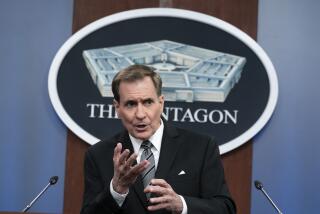U.S. military officials play down year-end Afghan review
- Share via
Reporting from Washington — U.S. military officials Wednesday damped expectations for quick results from offensives in Afghanistan and played down a year-end review that the Obama administration had portrayed as a major evaluation of the U.S.-led war.
“I would not want to overplay the significance of this review,” Army Gen. David H. Petraeus, who oversees U.S. forces in the Mideast and Afghanistan, told members of the House Armed Services Committee, referring to plans by the administration to evaluate progress in Afghanistan in December. “We would not make too much out of that.”
Administration officials announced the review last year when President Obama ordered 30,000 additional troops to Afghanistan. At the time, officials characterized it as an opportunity to evaluate whether it would be possible to begin handing off security responsibilities to Afghan forces in July 2011, the deadline set by Obama for beginning a U.S. drawdown.
“If it appears the strategy is not working, and we will not be able to transition to Afghan security forces by 2011, we will take a hard look at the strategy,” Defense Secretary Robert M. Gates said at the time.
But Petraeus emphasized Wednesday that December would be too soon to make a far-reaching evaluation, noting that all of the additional U.S. forces would have been there for only a few months.
A senior administration official said that showing progress by December remains important because of the need to reassure many wavering NATO allies that the U.S. strategy is working.
It was the second day of testimony for Petraeus, whose appearance before the Senate Armed Services Committee on Tuesday was cut short after he appeared to faint while answering questions.
Saying he had been dehydrated, he returned to the committee Wednesday morning and reassured Republicans that the July 2011 deadline is “not the date when the U.S. heads for the exits.”
Obama imposed the deadline as a way to pressure the government of Afghanistan to improve its army and police more rapidly, as well as take responsibility for governance in areas cleared of Taliban insurgents by North Atlantic Treaty Organization troops.
But the date is a continuing source of controversy with Afghan officials worried that the U.S. will be leaving and with Republicans who accuse the White House of lacking commitment to the Afghan mission.
Some military officials also fear that the White House might be tempted to withdraw forces too fast, jeopardizing security gains.
Petraeus stoked those concerns Tuesday when he said the deadline has his “qualified” support.
On Wednesday, he read a brief clarifying his statement. He stated his support for the deadline while emphasizing that his recommendations to Obama, focusing on how many troops should be removed over what period, would be made only as the deadline draws closer and would be based on the situation then.
“It is important that July 2011 be seen for what it is, a date when a process begins based on conditions,” he said.
His remarks were echoed Wednesday by other senior civilian and military officials who said in appearances before Congress that, though there are some signs of progress in Afghanistan, the effort is difficult and the situation is likely to get worse before it gets better.
“I think we’re moving in the right direction,” Gates told the Senate Appropriations Committee. “But this is not something where, week to week or month to month, you can be able to say we’re moving the front forward. That’s not the kind of fight this is.”
More to Read
Get the L.A. Times Politics newsletter
Deeply reported insights into legislation, politics and policy from Sacramento, Washington and beyond. In your inbox twice per week.
You may occasionally receive promotional content from the Los Angeles Times.











